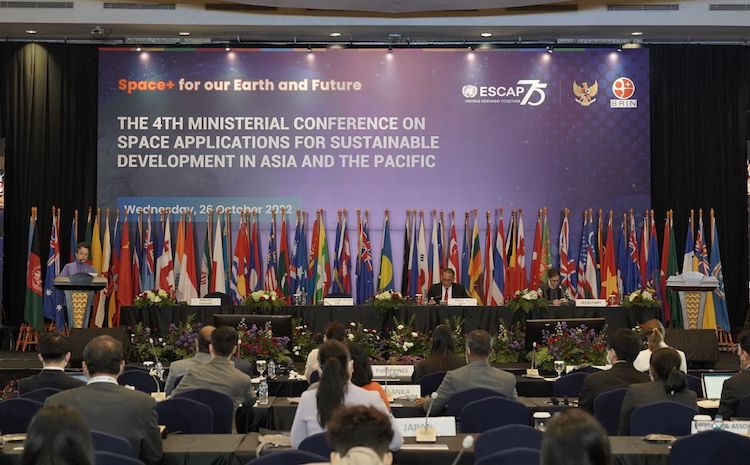By Santo D. Banerjee
BANGKOK (IDN) — Ministers and heads of national space agencies endorsed the Jakarta Ministerial Declaration on Space Applications for Sustainable Development in Asia and the Pacific at the close of a high-level meeting co-organized by the United Nations Economic and Social Commission for Asia and the Pacific (ESCAP) and the Government of Indonesia.
The Declaration shows the strong commitment of countries to using innovative space applications to address outstanding and emerging development challenges of persistent poverty, food security, threats to global health, and increasing vulnerability to disasters, climate change and environmental degradation.
“Without a doubt, this Declaration will not only sustain the momentum of increasing integration of space and geospatial information applications in support of sustainable development, but also reach countries in special situations to ensure that everyone in our region captures the benefits of space science, technology and its applications,” said Armida Salsiah Alisjahbana, United Nations Under-Secretary-General and Executive Secretary of ESCAP.
Space applications provide multiple solutions for socioeconomic development. The cooperation between countries in the region has greatly broadened over the years, going beyond disaster response to all thematic priority areas for achieving the Sustainable Development Goals.
Countries have implemented over 600 activities contributing to 156 out of the 188 actions identified in the 2018 Asia-Pacific Plan of Action on Space Applications for Sustainable Development.
To this end, delegates at the fourth Ministerial Conference on Space Applications for Sustainable Development in Asia and the Pacific agreed to accelerate Phase II of the Plan of Action under the guiding theme “Space+ for our Earth and Future,” comprising four core elements:
(i) leveraging innovative digital applications;
(ii) engaging end users, including the private sector and youth;
(iii) managing data and information more effectively; and
(iv) enhancing partnerships with national, regional and global stakeholders.
“Through the fourth Ministerial Conference, BRIN fully supports the Asia Pacific Action Plan on Space Applications for Sustainable Development (2018–2030) both in terms of research and innovation, as well as in terms of formulating policy recommendations related to use of space,” said Laksana Tri Handoko, Chair of the National Research and Innovation Agency of Indonesia (BRIN).
At the Conference, ESCAP also launched its compendium on Geospatial Practices for Sustainable Development in South-East Asia 2022, which documents more than 60 good practices in the subregion. Alongside well-established space applications in drought monitoring and early warning, South-East Asian countries have diversified its use of space technology into areas such as spatial mapping of poverty, tracking of greenhouse gas emissions and air pollution, and evidence-based accounting of land, renewable energy and other natural resources. [IDN-InDepthNews — 28 October 2022]
Photo credit: ESCAP


